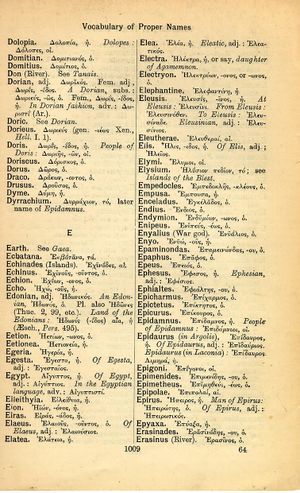Enyo: Difference between revisions
From LSJ
οὕτως εἴη ἡμίν ὁ Θεός βοηθός καὶ τὸ ἱερὸν Αὐτοῦ Εὐαγγέλιον ὧδε ἐμφανισθέντα-ὁρκισθέντα → so help us God and Ηis holy Gospel the things here declared and sworn
m (Text replacement - "}}]]" to "}}]]") |
m (Text replacement - "(|thumb)\n(\|link=)" to "$1$2") |
||
| Line 1: | Line 1: | ||
{{WoodhouseENELnames | {{WoodhouseENELnames | ||
|Text=[[File:woodhouse_1009.jpg|thumb | |Text=[[File:woodhouse_1009.jpg|thumb|link={{filepath:woodhouse_1009.jpg}}]][[Ἐνυώ]], -οῦς, ἡ. | ||
|link={{filepath:woodhouse_1009.jpg}}]][[Ἐνυώ]], -οῦς, ἡ. | |||
}} | }} | ||
{{Lewis | {{Lewis | ||
Revision as of 16:58, 18 May 2020
English > Greek (Woodhouse)
Ἐνυώ, -οῦς, ἡ.
Latin > English (Lewis & Short)
Enȳō: ūs, f., = Ἐνυώ,
I the goddess of war, pure Lat. Bellona (only in post-Aug. poets).
I Prop., Sil. 10, 203; Stat. Th. 8, 657.—
II Meton., war, battle: navalis, Mart. Spect. 24, 3.
Latin > French (Gaffiot 2016)
Ĕnȳō,¹⁵ ūs, f. (Ἐνυώ), nom grec de Bellone : Stat. Th. 8, 657 || [fig.] guerre, combat : Mart. Spect. 24, 3.
Latin > German (Georges)
Enȳō, us, f. (Ενυώ), die Kriegsgöttin, lat. Bellona, Sil. 10, 203. Stat. Theb. 8, 657. – meton. = Krieg, Mart. spect. 24, 3.

